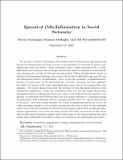| dc.contributor.author | Acemoglu, Daron | |
| dc.contributor.author | Ozdaglar, Asuman E. | |
| dc.contributor.author | Parandehgheibi, Ali | |
| dc.date.accessioned | 2011-03-18T21:06:59Z | |
| dc.date.available | 2011-03-18T21:06:59Z | |
| dc.date.issued | 2010-02 | |
| dc.date.submitted | 2009-09 | |
| dc.identifier.issn | 0899-8256 | |
| dc.identifier.issn | 1090-2473 | |
| dc.identifier.uri | http://hdl.handle.net/1721.1/61745 | |
| dc.description.abstract | We provide a model to investigate the tension between information aggregation and
spread of misinformation in large societies (conceptualized as networks of agents communicating
with each other). Each individual holds a belief represented by a scalar.
Individuals meet pairwise and exchange information, which is modeled as both individuals
adopting the average of their pre-meeting beliefs. When all individuals engage in
this type of information exchange, the society will be able to eff ectively aggregate the initial
information held by all individuals. There is also the possibility of misinformation,
however, because some of the individuals are \forceful," meaning that they influence
the beliefs of (some) of the other individuals they meet, but do not change their own
opinions. The paper characterizes how the presence of forceful agents interferes with
information aggregation. Under the assumption that even forceful agents obtain some
information (however infrequent) from some others (and additional weak regularity conditions),
we first show that beliefs in this class of societies converge to a consensus among
all individuals. This consensus value is a random variable, however, and we characterize
its behavior. Our main results quantify the extent of misinformation in the society by
either providing bounds or exact results (in some special cases) on how far the consensus
value can be from the benchmark without forceful agents (where there is efficient information
aggregation). The worst outcomes obtain when there are several forceful agents
and forceful agents themselves update their beliefs only on the basis of information they
obtain from individuals most likely to have received their own information previously. | en_US |
| dc.description.sponsorship | National Science Foundation (U.S.) | en_US |
| dc.description.sponsorship | United States. Air Force Office of Scientific Research | en_US |
| dc.language.iso | en_US | |
| dc.publisher | Elsevier B.V. | en_US |
| dc.relation.isversionof | http://dx.doi.org/10.1016/j.geb.2010.01.005 | en_US |
| dc.rights | Attribution-Noncommercial-Share Alike 3.0 Unported | en_US |
| dc.rights.uri | http://creativecommons.org/licenses/by-nc-sa/3.0/ | en_US |
| dc.source | MIT web domain | en_US |
| dc.title | Spread of (mis)information in social networks | en_US |
| dc.type | Article | en_US |
| dc.identifier.citation | Acemoglu, Daron, Asuman Ozdaglar, and Ali ParandehGheibi. “Spread of (mis)information in social networks.” Games and Economic Behavior 70.2 (2010): 194-227. | en_US |
| dc.contributor.department | Massachusetts Institute of Technology. Department of Economics | en_US |
| dc.contributor.department | Massachusetts Institute of Technology. Department of Electrical Engineering and Computer Science | en_US |
| dc.contributor.approver | Acemoglu, Daron | |
| dc.contributor.mitauthor | Acemoglu, Daron | |
| dc.contributor.mitauthor | Ozdaglar, Asuman E. | |
| dc.contributor.mitauthor | Parandehgheibi, Ali | |
| dc.relation.journal | Games and Economic Behavior | en_US |
| dc.eprint.version | Author's final manuscript | en_US |
| dc.type.uri | http://purl.org/eprint/type/JournalArticle | en_US |
| eprint.status | http://purl.org/eprint/status/PeerReviewed | en_US |
| dspace.orderedauthors | Acemoglu, Daron; Ozdaglar, Asuman; ParandehGheibi, Ali | en |
| dc.identifier.orcid | https://orcid.org/0000-0002-1827-1285 | |
| dc.identifier.orcid | https://orcid.org/0000-0003-0908-7491 | |
| mit.license | OPEN_ACCESS_POLICY | en_US |
| mit.metadata.status | Complete | |
